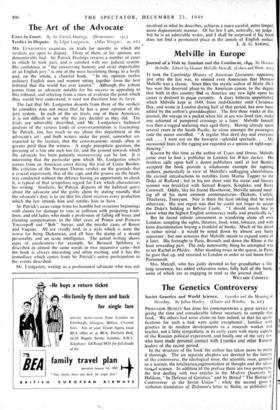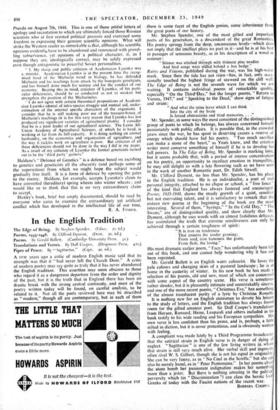The Genetics Controversy
Soviet Genetics and World Science, Lysenko and the Meaning of PROFESSOR HUXLEY has done his contemporaries a great service in giviftg the time and considerable labour necessary to compile this book. We others had some claim on him indeed, in that his quali- fications for such a -task were quite exceptional ; familiar with genetics in its modern developments as a research worker and teacher, not a little sympathetic in its early years with many aspects of the Russian political experiment, and finally one of the very few who have made personal contact with Lysenko and other Russian leaders of the recent period. In the structure of the book the author has taken pains to make it thorough. The six separate chapters are devoted to the history of the controversy, the ideological issue, the scientific issue, genetics as a science, the totalitariatwagimentation of thought and the situa- tion.,of science. In addition td the preface there are two postscripts, the first dealing with two articles in the Modern Quarterly by Haldane, "In Defence of Genetics," and by Bernal "The Biologizal Controversy in the Soviet Union " ; while the second gives 3 verbatim translation of Zhdanov's letter to Stalin, as published IS
Pravda on August 7th, 1948. This is one of those pitiful letters of apology and recantation to which are ultimately forced those Russian scientists who at first resisted political pressure and exercised some freedom in expressing their genuine scientific opinions. What will strike the Western reader as remarkable is that, although his scientific opinions evident15‘ have to be abandoned and renounced with grovel- ling subservience, yet opinions of a political character, if. as 1 suppose they are, ideologically correct, may be safely expressed even though antagonistic to powerful Soviet personalities.
" 3. My sharp and public criticism of Academician Lysenko was a mistake. Academician Lysenko is at the present time the recog- nised head of the Michurin trend in biology, he has defended Michurin and his teachings from attack by the bourgeois geneticists, and has himself done much for science and for the conduct of our economy. Bearing this in mind, criticism df Lysenko, of his parti- cular deficiencies, should be so conducted as not to weaken but strengthen the position of the Michurinites.
" I do not agree with certain theoretical propositions of Academi- cian Lysenko (denial of intra-species struggle and mutual aid, under- estimation of the internal specific characters of the organism). I consider that he is still making poor use of the treasure-houseof Michurin's teachings (it is for this very reason that Lysenko has not produced any significant varieties of agricultural plants). I consider that he is a poor leader of our agricultural science. The Lenin All- Union Academy of Agricultural Sciences, of which he is head, is
• working at far from its full capacity. It is doing nothing on animal husbandry, on the economics and organisation of agriculture, and the way it tackles work on agriculture is poor. But criticism of all these deficiencies should not be done in the way 1 did in my paper. As a result of my criticism of Lysenko the formal geneticists turned out to be the ' third party' gainers."
Haldane's " Defence of Genetics " is a defence based on ascribing to genetics and geneticists all the obscurity (and perhaps some of the superstition) from which we might hope the subject would gradually free itself. It is a form of defence by opening the gates to the enemy. Haldane, for example, accepts Lysenko's claim to have converted (hereditary) spring wheats into winter wheats ; and would like us to think that this is no very extraordinary claim to accept.
Huxley's book, brief but amply documented, should be read by everyone who cares to examine the extraordinary yet artificial conflict which has developed in the intellectual life of our time. R. A. FISHER.



































 Previous page
Previous page